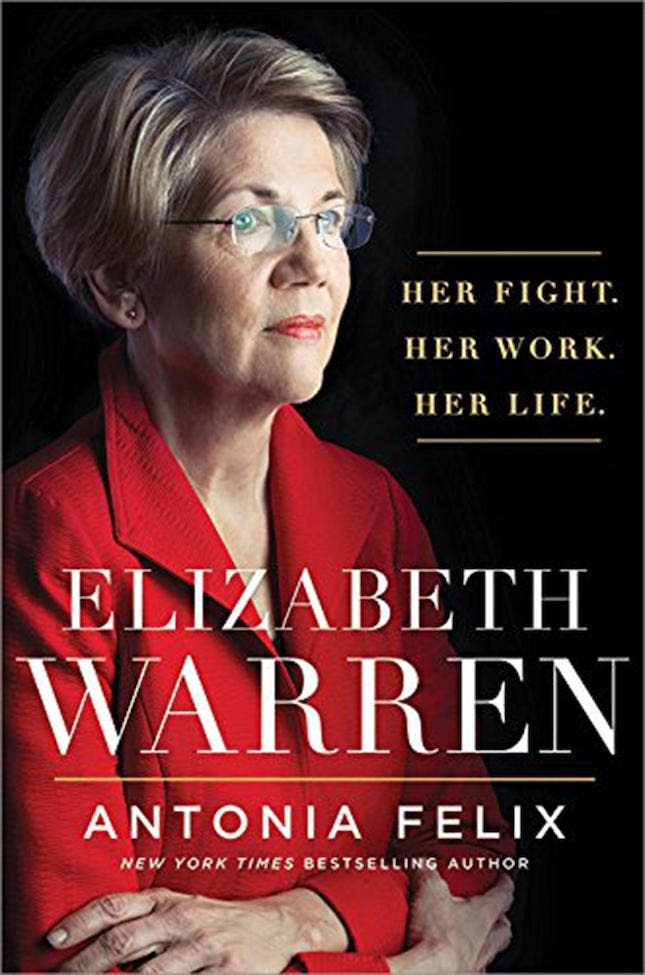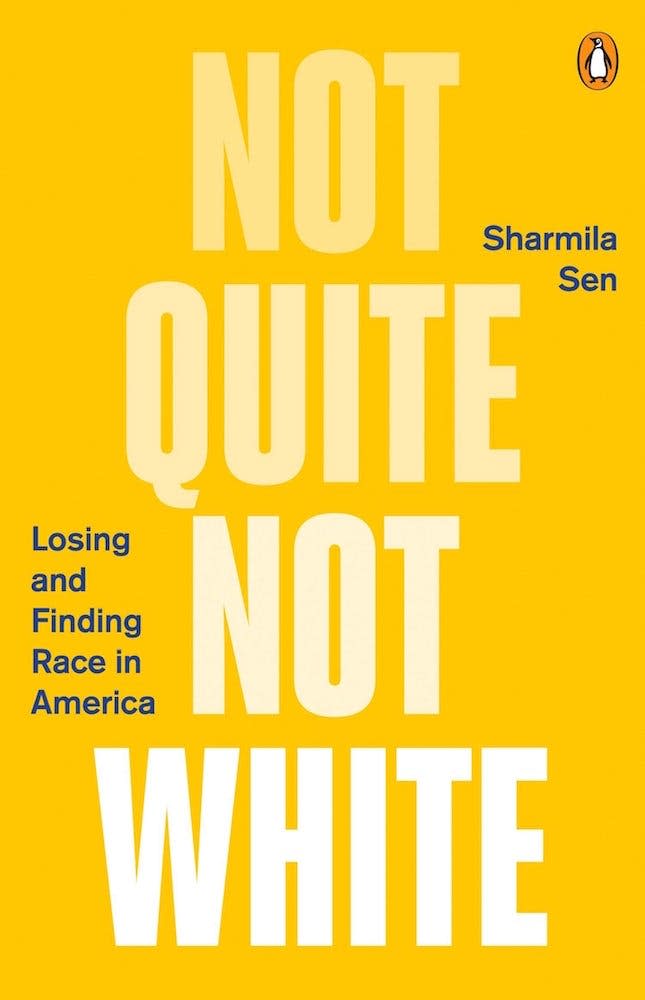3 New Books About Outsiders Changing the System
The new books in this week’s book club feature women who began as outsiders, but have ascended the ranks and are trying to change misogynist, racist, and capitalist systems from the inside. No matter how established their names have become, they’re still radicals to the fossilizing status quo.
1. Elizabeth Warren: Her Fight. Her Work. Her Life. by Antonia Felix ($26): The words “Nevertheless, she persisted” have become something of a mantra for feminists, revolutionaries, and Elizabeth Warren supporters. They were hurled as an accusation against Warren when she was silenced for reading Coretta Scott King’s 1986 letter, detailing concerns about Jeff Sessions’ history of racist judgments, during his Attorney General confirmation debate. Now, they are seen instead as an accolade, a mark of pride at how much Warren has been able to get under the political establishment’s skin. In her new biography of the first female senator elected in Massachusetts, Antonia Felix argues for Warren’s legacy beyond that phrase — which in itself has a more complex background than its current use, having started in a debate about race.
“The Great Recession still lingered for many when Massachusetts voters sent Elizabeth Warren to the Senate. She told them she would be their champion, and year by year, her consistent focus on issues that impact the household budgets of working people has strengthened her perception as that champion. Warren’s grasp of the role of race in America is joined by her knowledge of working people’s economic struggles and the forces that impact them, gleaned from a thirty-year-log career of scholarship and teaching in the law that focused on bankruptcy. People were angry at the big banks, whose risk-taking cost them their pensions, homes, and jobs, and Elizabeth became a focal point for answers, offered up in plainspoken prose. She knows the kitchen table struggles because she lived them, and that story of a populist’s evolution begins in Oklahoma.”
Felix takes readers through Warren’s conservative youth on the “ragged edge of the middle class,” and her early love of teaching and success on the high school debate team. She writes of Warren’s rise as a legal scholar with expertise in bankruptcy law, which has led her as a politician to take on the corruption of Wall Street financial firms, famously stating that, for most in the middle class, the system truly was rigged against them. Because of her attitude and ambition, she’s no stranger to attacks and controversy, and Felix details the 2012 Senate race flap over Warren’s claims to Native American heritage on her mother’s side. Now firmly ensconced in government, and under constant speculation of a future presidential run, Warren works on the inside while attempting to retain the outsider’s perspective of her roots.
2. Not Quite Not White: Losing and Finding Race in America by Sharmila Sen ($16): “I stood at the entrance of the U.S. consulate in Calcutta in 1982. In 1965, American immigration laws had been rewritten to allow for a greater number of non-Europeans to enter the country. Not only were Indians and other Asians considered unwanted newcomers before 1965, even naturalization-the process by which a foreign-born immigrant becomes a U.S. citizen-was disallowed for most who were not white until the 1950s. I knew little of this history when I entered the consulate with my parents. I did not even know I had something called race. Race as a category had not been part of the Indian census since 1951. I was about to move to a nation where nearly every official form had a section in which I would be offered an array of racial categories and expected to pick one.”
When Sharmila Sen, Executive Editor-At-Large of Harvard University Press, immigrated to America from India as a child in 1982, the official “race” of Indian immigrants was in flux. When the census began in the late 1700s, people of Indian heritage did not fit into any of the three possible categories (though an “Indian” designation was one of them, it did not, at the time, refer to people from India). For the most part, there was a liminal space in which they existed, which largely amounted to “not quite white,” and the inability to become nationalized citizens until the 1940s. In 1970, though, the US Census Bureau made a choice: Indians were now considered to be white. A decade later, the reclassification of “Asian” emerged, and finally, there was option of “self-reporting” — which resulted in approximately a quarter of those affected reporting themselves as white.
Sen writes about this complicated history of Indian immigration to America and the country’s particular concept of racial labeling that vacillates between color, geography, religion, and language. She takes us through her childhood and attempts at assimilation, while growing increasingly aware of the issue of race. Sen had to recontextualize her identity among these new labels, vastly different from the equally-intricate definitions and divisions she’d seen in her home country, like “Veg” vs. “Non-veg,” often easily-discernable just by surname. (Though skin color was, in its own way, still a catalyst for discrimination.) Eventually growing tired of performing whiteness to succeed, she began loudly identifying as “not white” in order to challenge the status quo of what it means to be considered American. Sen’s book considers the many shades of race in America — a far cry from those first three boxes.
3. A Politically Incorrect Feminist: Creating a Movement with Bitches, Lunatics, Dykes, Prodigies, Warriors and Wonder Women by Phyllis Chesler ($28): Phyllis Chesler was a major player in Second Wave Feminism. Daughter of a working-poor Orthodox Jewish immigrant and his American wife from a Polish family, Chesler grew up a rebel. Now an emerita Professor of Psychology at the College of Staten Island (CUNY), she taught one of the very first college courses in women’s studies, eventually turning it into a minor and a major, and co-founded the Association for Women in Psychology. Writer of influential works from 1972’s Women and Madness, about the double standards that plague gendered mental health care, to 2005’s The Death of Feminism and 2011’s Mothers On Trial: The Battle for Children and Custody, her consultations have been integral to several landmark legal cases.
A so-called “radical feminist” who is even now inciting controversy, Chesler helped form NOW, gave the keynote speech at the first feminist conference on rape, and stormed the podium at a national psychologist’s convention to insist that the American Psychological Association pay a million dollars in reparations to women abused by the system. She regrets that each generation of feminists have “had to reinvent the wheel,” now telling the story of her generation so they won’t be forgotten. She spills details about some of the biggest names in the movement, including Gloria Steinem and Andrea Dworkin, along with influential individuals you might not know yet (but should). Candid and passionate, Chesler gives us the inside scoop on an outsider’s movement that had major historical reverberations, and will continue to have a massive impact on the future.
“I’ve written many books but never before have I written a book in this way,” Chesler begins. “The chapters tumbled out all at once; I could barely keep up with them. Stories that belonged at the end of the book demanded my attention even as I was writing about something that took place much earlier. This book happened just like second-wave feminism did: all at once. The world had never seen anything like us, and we’d never seen anything like each other. We – who only yesterday had been viewed as cunts, whores, dykes, bitches, witches, and madwomen; we who had been second- and third-class citizens – had suddenly become players in history. The world would never be the same, and neither would we.”
What books rock your foundations? Tag us in your next system-shaking read @BritandCo.
Brit + Co may at times use affiliate links to promote products sold by others, but always offers genuine editorial recommendations.





